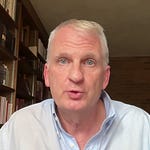This is the podcast version of an essay I wrote a week ago, before the Munich Security Conference brought some of the explanation points. Since then, the thesis has only been confirmed by the disastrous Russian-American talks and American slanders of and threats to Ukrainians. Please share this with those who might want or need to hear this. If you are thinking about how to help Ukrainians, consider Come Back Alive (Ukrainian NGO that supports soldiers on the battlefield and veterans), United 24 (the Ukrainian state platform for donations, with many excellent projects), RAZOM (an American NGO, tax-deductible for US citizens, which cooperates with Ukrainian NGOS to support civilians), and Documenting Ukraine (a project I help run that helps to give Ukrainians a voice, also tax-deductible for Americans). The text of the original essay begins below.
Americans have a certain idea of freedom. We are fine just the way we are and the only problem are the barriers in the outside world. In this mental world, Musk’s hollowing out of the government can seem justified. Trump’s betrayal of friends and destruction of alliances can seem convenient. We will be great again by being all alone, with no one to trouble us.
This fantasy leads right to tragedy. It sets the stage for the weak strongman.
Trump is a strongman in the sense that he makes others weak. He is strong in a relative sense; as Musk destroys institutions, what remains is Trump’s presence. But other sorts of power meaning vanish, as Musk takes apart the departments of the American government that deal with money, weapons, and intelligence. And then the United States has no actual tools to deal with the rest of the world.
The strongman is weak because no one beyond the United States has anything to want (or fear) from the self-immolation. And weak because Trump submits to foreign aggression, putting waning American power behind Russia.
The weak strongman undermines the rules, but cannot replace them with anything else. He creates the image of power by his rhetorical imperialism: America will control Greenland, Panama, Mexico, Canada, Gaza, etc. From there, it is hard to say that others are wrong when they invade other countries. The weak strongman is left endorsing other people’s invasions, as with Russia and Ukraine. He lacks the power to resist them. And he lacks the power to coerce them. And, ironically, he lacks the power to carry out wars himself. He lacks the patience, and he lacks the instruments.
Many Americans fear Trump, and so imagine that others must. No one beyond America fears Trump as such. He can generate fear only in his capacity as neighborhood arsonist, as someone who destroys what others have created. America’s friends are afraid not of him but of what we all have to lose. America’s enemies are not frightened when Trump kicks over the lantern and sets things on fire. Quite the contrary: he is doing exactly what they want.
Trump plays a strongman on television, and he is a talented performer. But the strength consists solely of the submissiveness of his audience. His performance arouses a dream of passivity: Trump will fix it, Trump will get rid of our problems, and then we will be free. And of course that kind of Nosferatu charisma is a kind of strength, but not one that can be brought to bear to solve any problems, and not one that matters in the world at large. Or rather: it matters only negatively. As soon as Trump meets someone with a better dictator act, like Putin, he submits. But he can only enable Putin. He can’t really even imitate him.
Trump’s supporters might think that we don’t need friendships because the United States can, if necessary, intimidate its enemies without help. This has already been proven wrong. Trump can make things worse for Canada and Mexico, in the sense that a sobbing boy taking his ball home makes things worse. But he cannot make them back down. Trump has not intimidated Russia. He has been intimidated by Russia.
The cruelty that makes Trump a strongman at home arose from the destruction of norms of civil behavior and democratic practice. Unlike any other American politician before him, Trump has scorned the law and used hate speech to deter political opponents here. For years he has used his tweets to inspire stochastic violence. This intimidates some Americans. It has, for example, led to a kind of self-purge of the Republican Party, opening the way for Trump, or in fact for Musk, to rule with the help of tamed and therefore predictable cadres. The effect of this is that people who have submitted to Trump see him as a strongman. But what they are experiencing is in fact their own weakness. And their own weakness cannot magically become strength in the wider world. Quite the contrary.
Stochastic violence cannot be applied to foreign leaders. Trump has said that he can stop the war in Ukraine. He wrote a tweet directed at Vladimir Putin; but the capital letters and exclamation points did not change the emotional state of the Russian leader, let alone Russian policy. And no one in Irkutsk is going to threaten or hurt Putin because Donald Trump wrote something on the internet. Something that works in the United States is not relevant abroad. In fact, the tweet was a sign of weakness, since it was not followed by any policy. Putin quite rightly saw it as such. Trump and his cabinet now repeat Putin’s talking points about the Russian invasion of Ukraine.
One could generously interpret Trump’s tweet to Putin threatening sanctions and such as an act of policy. I saw conservatives do that, and I would have been delighted had they been right. But I fear that this was just the characteristic American mistake of imagining that, because Americans react submissively to Trump’s words, others must as well. For words to matter, there has to be policy, or at least the possibility that one might be formulated. And for there to be policy, there have to be institutions staffed with competent people. And Trump’s main action so far, or really Musk’s action so far, has been to fire exactly the people who would be competent to design and implement policy. Many of the people who knew anything about Ukraine and Russia are gone from the federal government.
And now Trump is trying to make concessions to Russia regarding issues directly related to Ukrainian sovereignty on his own, without Ukraine, and indeed without any allies. He is showing weakness on a level unprecedented in modern US history. His position is so weak that it is unlikely to convince anyone. Trump is a sheep in wolf’s clothing. The wolves can tell the difference. Russians will naturally think that they can get still more.
Ukrainians, for that matter, have little incentive to give up their country. Trump can threaten them with cutting US arms, because stopping things is the only power he has. But Ukrainians must now expect that he would do that anyway, given his general subservience to Putin. If the US does stop support for Ukraine, it no longer has influence in how Ukraine conducts the war. I have the feeling that no one in the Trump administration has thought of that.
It is quite clear how American power could be used to bring the war to an end: make Russia weaker, and Ukraine stronger. Putin will end the war when it seems that the future is threatening rather than welcoming. And Ukraine has no choice but to fight so long as Russia invades. This is all incredibly simple. But it looks like Trump is acting precisely as is necessary to prolong the war and make it worse.
Thus far he and Hegseth have simply gone public with their agreement with elements of Russia’s position. Since this is their opening gambit, Russia has every incentive to keep fighting and to see if they can get more. The way things are going, Trump will be responsible for the continuing and escalation of the bloodshed, quite possibly into a European or open global conflict. He won’t get any prizes for creating the conditions for a third world war.
It’s an obvious point, but it has to be made clearly: no one in Moscow thinks that Trump is strong. He is doing exactly what Russia would want: he is repeating Russian talking points, he is acting essentially as a Russian diplomat, and he is destroying the instruments of American power, from institutions through reputation. No American president can shift an international power position without policy instruments. And these depend on functioning institutions and competent civil servants. In theory, the United States could indeed change the power position by decisively helping Ukraine and decisively weakening Russia. But that theory only becomes practice through policy. And it is not hard to see that Musk-Trump cannot make policy.
Even should he wish to, Trump can not credibly threaten Russia and other rivals while Musk disassembles the federal government. Intimidation in foreign affairs depends upon the realistic prospect of a policy, and policy depends, precisely, on a functioning state.
Let us take one policy instrument that Trump mentioned in his tweet about Putin: sanctions. Under Biden, we had too few people in the Department of the Treasury working on sanctions. That is one reason they have not worked as well against Russia as one might have hoped. To make sanctions work, we would need more people on the job, not fewer. And of course we would also need foreign powers to believe that Treasury was not just an American billionaire’s plaything. And that will be hard, because their intelligence agencies read the newspapers.
The United States cannot deal with adversaries without qualified civil servants in the departments of government that deal with money, weapons, and intelligence. All of these are being gutted and/or run by people who lack anything vaguely resembling competence.
Americans can choose to ignore this, or to interpret it only in our own domestic political terms. But it is obvious to anyone with any distance on the situation that the destruction of the institutions of power means weakness. And it creates a very simple incentive structure. The Russians were hoping that Trump would return to power precisely because they believe that he weakens the United States. Now, as they watch him (or Musk) disassemble the CIA and FBI, and appoint Tulsi Gabbard and Kash Patel, they can only think that time is on their side.
The Russians might or might not, as it pleases them, entertain Trump’s idea of ceasefire between Ukraine and Russia. Even if they accept the ceasefire it will be to prepare for the next invasion, in the full confidence that a United States neutered by Musk-Trump will not be able to react, that the Europeans will be distracted, and that the Ukrainians will find it harder to mobilize a second time.
Trump is not only destroying things, he is being used as an instrument to destroy things: in this case, used by Russia to destroy a successful wartime coalition that contained the Russian invasion and prevented a larger war.
What is true for Russia also holds for China. The weak strongman helps Beijing. Time was not really on China’s side, not before Trump. There was no reason to think that China would surpass the United States economically, and therefore politically and militarily. That had been the great fear for decades, but by the time of the Biden administration the trend lines were no longer so clear, or indeed had reversed. But now that Trump (or rather Musk) has set a course for the self-destruction of American state power, Beijing can simply take what it would once have had to struggle to gain, or would have had to resign from taking.
A weak strongman brings only losses without gains. And so the descent begins. Destroying norms and institutions at home only makes Trump (or rather Musk) strong in the sense of making everyone else weak. In our growing weakness, we might be all tempted by the idea that our strong man at least makes us a titan among nations.
But the opposite is true. The world cannot be dismissed by the weak strongman. As a strongman, he destroys the norms, laws, and alliances that held back war. As a weakling, he invites it.












